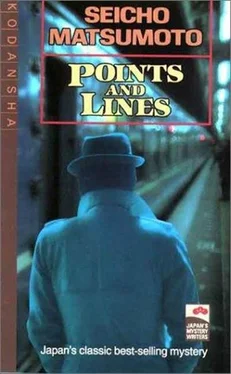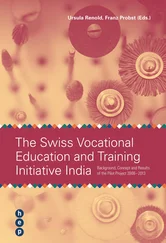Seichō Matsumoto - Points And Lines
Здесь есть возможность читать онлайн «Seichō Matsumoto - Points And Lines» весь текст электронной книги совершенно бесплатно (целиком полную версию без сокращений). В некоторых случаях можно слушать аудио, скачать через торрент в формате fb2 и присутствует краткое содержание. Жанр: Детектив, на английском языке. Описание произведения, (предисловие) а так же отзывы посетителей доступны на портале библиотеки ЛибКат.
- Название:Points And Lines
- Автор:
- Жанр:
- Год:неизвестен
- ISBN:нет данных
- Рейтинг книги:5 / 5. Голосов: 1
-
Избранное:Добавить в избранное
- Отзывы:
-
Ваша оценка:
- 100
- 1
- 2
- 3
- 4
- 5
Points And Lines: краткое содержание, описание и аннотация
Предлагаем к чтению аннотацию, описание, краткое содержание или предисловие (зависит от того, что написал сам автор книги «Points And Lines»). Если вы не нашли необходимую информацию о книге — напишите в комментариях, мы постараемся отыскать её.
Points And Lines — читать онлайн бесплатно полную книгу (весь текст) целиком
Ниже представлен текст книги, разбитый по страницам. Система сохранения места последней прочитанной страницы, позволяет с удобством читать онлайн бесплатно книгу «Points And Lines», без необходимости каждый раз заново искать на чём Вы остановились. Поставьте закладку, и сможете в любой момент перейти на страницу, на которой закончили чтение.
Интервал:
Закладка:
The two bodies were transported to the police station by special van. The detectives climbed aboard also and huddled inside to keep warm. With the unsightly objects removed, Kashii Bay looked peaceful again in the bleak winter sunshine. And the wind kept blowing in from the sea.
The bodies were carefully examined at the police station. Many pictures were taken as each article of clothing was removed.
A wallet was found in the pocket of the man's jacket. He could therefore be identified. The wallet also contained a railway pass. It was a commutation ticket for the run between Asagaya and Tokyo Station, made out in the name of Kenichi Sayama, age 31. The business cards gave further details. Under the man's name was printed: X Ministry, 7 Section, Assistant Section Chief. His home address appeared in the righthand corner.
The detectives looked at each other. The 7 Section of the X Ministry was currently being investigated on charges of bribery and almost every day some item concerning the scandal appeared in the papers.
"Any last messages?" the chief asked.
"We've searched very carefully. There was nothing in any of his pockets. Less than ten thousand yen in cash, a handkerchief, a shoehorn, yesterday's newspaper, folded, and this crumpled receipt from a railway dining car-that was all we could find."
"A dining car receipt? What an odd thing to keep." The chief picked it up and carefully smoothed away the creases. It was crumpled as though carelessly left at the bottom of the pocket. "The receipt is dated January 14," the chief read. "The train number is 7 and it's punched for one person. The bill amounted to 340 yen. The receipt was issued by the Tokyo branch of the Japan Restaurant Co. But it doesn't say what he ordered."
"How about the woman?" someone asked. Her identity had also been established. In a folding pocketbook containing 8,000 yen were four or five business cards that read: "Tokyo, Akasaka, Restaurant Koyuki, Otoki."
"Otoki must be her name," the chief remarked. "She was probably a waitress at the Koyuki Restaurant in Akasaka. This looks like the love suicide of a government official and a restaurant waitress." He ordered telegrams sent to the addresses on both cards.
The bodies were examined further by the police doctor. There were no superficial wounds. The cause of the deaths was clearly from poisoning by potassium cyanide, and the presumed time of death was between nine and eleven o'clock of the previous night. "That means that they were walking on the beach at that hour, then committed suicide," said one of the detectives.
"They must have taken a long time saying goodbye," another one remarked pointedly. However, a medical examination showed no signs of intercourse prior to their death. This surprised the detectives. "They died remarkably innocent," one of them remarked cynically. Again it was confirmed that both deaths were from poisoning by potassium cyanide.
"They must have left Tokyo on the fourteenth," said the chief, checking the date on the dining car receipt. "Today is the twenty-first. Which means they left a week ago. I suppose they stopped off somewhere on the way, then came to Fukuoka to look for a place to die. Say, call the station and find out what this 'train number 7' means."
One of the detectives went to the telephone. He soon returned with the report. "The train is the super-express from Tokyo to Hakata. It's called the Asakaze."
"What, the super-express to Hakata?" The chief looked skeptical. "I wonder if they came directly to Hakata. If so, they either stayed the whole week in Hakata or visited other parts of Kyushu. They must have had some baggage; we must look into that. Take their pictures and check all the inns and hotels in the city. See if anyone recognizes them."
One of the men spoke up. "Chief, may I see that dining car receipt?" It was the thin, dark-skinned detective, the small man with the big eyes and the unshaven face. He had been in the original group that went to Kashii Bay when the bodies were discovered. His suit was as shabby as his overcoat, and his frayed necktie was askew. His name was Jūtarō Torigai and he was one of the senior detectives.
Torigai studied the receipt which he had unfolded with his bony and not very clean fingers. He was muttering to himself, "For one person, eh! I suppose he dined alone."
The chief overheard him. "The woman didn't accompany him to the dining car probably because she didn't care to eat."
"But…" objected Torigai.
"But what?" asked his superior.
"But chief, a woman likes to eat, you know. Even if she's not hungry she'll usually go along with her escort and have a cup of coffee or some dessert with him."
The chief laughed. "That's true," he said, "but maybe this time she was so full she couldn't manage even that."
Torigai looked as if he were about to say something, but he changed his mind. He put on his hat, a very old hat with a floppy brim that seemed to match his personality, and quietly walked away. He was wearing a pair of shoes that were down at the heels, and he dragged his feet as he walked.
When the detectives had left, the room regained its air of emptiness and futility. One or two of the younger men remained behind; they put more charcoal in the brazier and every once in a while filled the teacup on the chief's desk.
Later in the afternoon, as the sun's rays, filtering through the window, grew weaker, footsteps resounded outside and the room suddenly filled with people. These were not policemen but newspaper reporters.
"Chief! A certain Sayama, assistant section chief in a Tokyo ministry, died in a love suicide. We were just notified by our head office and rushed over." Their voices betrayed their excitement as they pushed their way into the room. The Tokyo newspapers had immediately assumed a connection between the political scandal and the suicides and had alerted their offices in Fukuoka.
The morning papers carried in big headlines the news of the love suicide of Kenichi Sayama, assistant section chief of X Ministry, and a restaurant waitress. In addition to the two newspapers that have the largest nationwide circulation, the important local papers reported the news in detail. It was not an ordinary case of double suicide. The deaths were linked with the bribery case in a government ministry. All the papers broadly hinted that Sayama's death was connected with the scandal. The Public Prosecutor's Office was quoted as saying that Sayama had not been summoned to appear; nevertheless, according to the stories in the press, it was certain that Sayama would have been called up as a witness and that he had committed suicide out of fear that the scandal would involve people higher up.
These newspapers were stacked on the chief's desk. The chief himself was looking over the contents of a small leather suitcase.
The suitcase had been discovered as a result of a thorough check, lasting through most of the night, of the inns in Fukuoka City. It had been found by a young detective at an inn called Tambaya. The inn reported that the man, identified by the picture the detective carried with him, had been a recent guest. In the register he was listed as Taizō Sugawara, 32, a businessman; address: 26 Minami Nakadōri, Fujisawa City. He had been alone from the night of the fifteenth until he departed on the night of the twentieth, after paying his bill. At that time, he had left the suitcase behind, saying that he would pick it up later.
The suitcase contained only such ordinary things as toilet articles, extra shirts and underwear and a few magazines that had probably been bought on the train. There was not even a notebook, let alone a letter or a farewell note.
When he finished examining the suitcase the chief turned to the young detective who had brought it to the station. "Did you say the man was alone?" he asked.
Читать дальшеИнтервал:
Закладка:
Похожие книги на «Points And Lines»
Представляем Вашему вниманию похожие книги на «Points And Lines» списком для выбора. Мы отобрали схожую по названию и смыслу литературу в надежде предоставить читателям больше вариантов отыскать новые, интересные, ещё непрочитанные произведения.
Обсуждение, отзывы о книге «Points And Lines» и просто собственные мнения читателей. Оставьте ваши комментарии, напишите, что Вы думаете о произведении, его смысле или главных героях. Укажите что конкретно понравилось, а что нет, и почему Вы так считаете.












